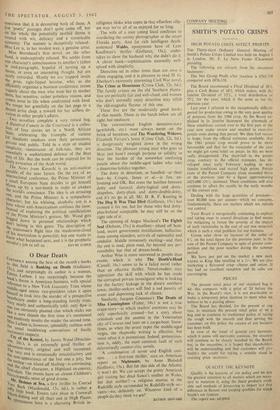0 Dear Death
c.LRIAINiy among the best of the month's books 1Sthisfield is Banking on Death (Gollancz, ts.), and surprisingly its author is a woman, IThna Lathen. I say surprisingly because the "°01('s theme is American business, with special reference to a New York Guaranty Trust whose ;ntddle-aged senior vice-president takes it upon Mself to look into the murder of a prospective evenefi et.,,--e'arY under a long-standing family trust. un-:3', nicely and authentically told; only flaw is '00 obviously planted clue which sticks out and a sore thUmb the first time it's mentioned 41.!:1 Positively insults the reader the second time. r iss Lathen is, however, splendidly ruthless with !le usual maddening conventions of finally 'aerosanct suspects. soCr3' of the Kestrel, by James Wood (Hutchin- n' !6"' is an extremely good thriller or ad Thven-nre-story, original and well recounted. the very end is emotionally unsatisfactory and he sne°ttnin-aPPea but ranee of the lost one a pity, g—an island Qtr Mallaig----is convincing, first-class the chief character, a Highland ex-convict, ns`-elass. The events have an almost Children s Ale el°Pdia sense of good drama. Nto r' Holmes at Sea, a first thriller by Conrad jolly ark (Macdonald,6d.), is rather a (sh"Y book. Events take place in Cornwall Its ark-ilshing and all that) and in High Place. s. erhanyrnous hero is a charming British in-
telligence bloke who copes in that effortless silly- ass way we've all of us enjoyed for so long.
The wife of a nice young local confesses to murdering the society photographer at the smart Florida party. And fat rich intelligent death- sentenced Waldo, eponymous hero of Lane Kauffman's thriller (Gollancz, 15s.), under- takes to show the husband why she didn't do it. A clever book—sophistication unusually well- spiced with simplicity.
Detection set in other times than our own is often engaging, and it is pleasure to read M. G. Eberhart's extremely interesting Civil War novel, The Crime at Honotassa (Crime Club, 12s. 6c1.). The family crimes on the old Southern planta- tion are perfectly fair and well-clued, and women who don't normally enjoy detection may relish the old-magnolia flavour of this one.
These five are the moderately good books of this month. Those in the batch below arc all right, but mediocre.
The conventional English detective-story (gentlefolk, etc.) must always teeter on the brink of boredom, and The Wandering Widows, Elizabeth Ferrars's latest (Crime Club, 12s. 6d.), is dangerously weighted down in the wrong direction. The pleasant young man who goes to Skye just hasn't enough purpose or solidity to bear the burden of the somewhat confusing puzzle about the middle-aged ladies who take a disastrous holiday together.
The dotty in detection, as handled—at their best—by Crispin, Innes et al.—is fun, en- livening and OK. But cross the hairline between dotty and farcical, dotty-logical and dotty- shapeless, dotty-plain and dotty-double-dotty, and it's no go at all. Mr. H. R. F. Keating in The Dog It Was That Died (Gollancz, I5s.) has crossed it for me, but for those who find dotty- plus-Ireland acceptable, he may still be on the right side of it.
The opening of Angus Macleod's The Eighth Seal (Dobson, I5s.) is excellent—island off Scot- land, secret government installations, hallucina- tions among islanders, arrivals of rationalist and credulist. Middle immensely exciting—and then the end is mad, plain mad, far beyond any per- missibility but that of dream-books.
Arthur Wise is more interested in people than events, which is why The Death's-Head (Cassell, 16s.) seems to be a failed novel rather than an effective thriller. Novel-readers may appreciate the skill with which he has Made the corrupted private investigator who is looking for the factory leakage in the dreary northern town; thriller-seekers will find a sad paucity of event and depressing lack of climax.
Similarly, Jacques Cousseau's The Death of Miss Cunningham (Faber, I8s.) is not a true crime-story—in which readers' emotions may be only superficially aroused—but a story about criminals and the anomie in the Venezuelan city of Caracas and later on a cargo-boat. Some- times, as when the priest rapes the middle-aged virgin, the rhapsodic writing is effective, but more often it is pretentious. Indeed, pretentious- ness is, oddly, the most common fault of such determinedly counter-elite novels.
`A combination of terror and English cosi- ness . . . a first-rate thriller,' says an American report on Nightmare, by Anne Blaisdell (Gollancz, 15s.). But for this side of the Atlantic it won't do. We can accept the pretty American girl visiting her dead fiancé's mother in Wales, but that mother?—a religious maniac in the Radcliffe style surrounded by Radcliffe-style ser- vants—no, definitely no. Whatever kind of a people do they think we are?
ESTHER HOWARD






























 Previous page
Previous page